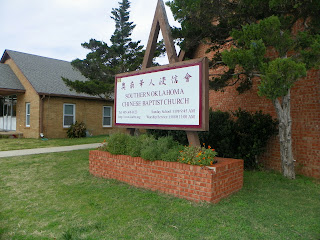The Constant Struggle For Comprehensive Coverage
In almost any journalism school, they teach to be diverse along with being complete in your coverage. There are certain communities of people in the United States that do get a lot of coverage, but not only because they are diverse, because their community does things or something happens to them that is newsworthy. But other groups, such as the Asian-American community, are divided on how their specific community is covered and portrayed in American media.
Members of the Asian community here in Norman felt that media could definitely do a better job at giving equal coverage to all the diverse communities within the area.
Southern Oklahoma Chinese Baptist Church is a bilingual church right here in Norman.
Member of the Southern Oklahoma Chinese Baptist Church, Jen Teck Kao, says he wants people outside of the Asian community to know about “our culture, our heritage, where we come from, our background back in our native countries.”
But should a journalist cover a story just for the sake of being diverse?
Dr. Xifan Liu, professor at the Oklahoma School of Science and Math, has worked for media outlets in the United States, as well as in China.
Dr. Xifan Lui realizes that news outlets are always looking for what the most people will want to hear.
When asked what he thought about coverage of his community in the United States media, he had an unexpected answer. He feels that, while the Asian community may not have extensive coverage, they are covered when it is important. Important being when it impacts more than just this specific community. Lui emphasized the fact that it is important for journalists to cover the important issues, and avoid choosing stories based on how diverse they make your publication appear.
He supports this by saying “[media outlets] are not interested to have comprehensive balance of coverage, that never, ever is their goal. They just cover what they believe is important, what they know will fit the taste of their readers.”
Student at OSSM, Vincent Peng, agreed with his professor. While he did feel like there were opportunities that media outlets could use to over the Asian community, he understood why they had to choose other issues.
Vincent Peng is a senior at the Oklahoma School of Science and Math.
“Major areas of media are like politics, sports, and like celebrities. And these are areas that do not usually include a lot of Asians,” said Peng.
Peng related the issue to politics, specifically. Saying that if there were two politicians that media were considering covering, one for the sake of bills he was pushing and the other just for the diversity his ethnicity provides, Peng would say cover the politician who is doing his job well, that is what people want to hear.
“What you’re going to report and what you’re not going to report; if you’re only basing that on race…as a journalist I think you should cover what’s important rather than what’s diverse,” said Peng.



No comments:
Post a Comment